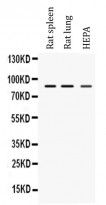ARG41730
anti-MEFV / Pyrin antibody
anti-MEFV / Pyrin antibody for Western blot and Mouse,Rat
Overview
| Product Description | Rabbit Polyclonal antibody recognizes MEFV / Pyrin |
|---|---|
| Tested Reactivity | Ms, Rat |
| Tested Application | WB |
| Host | Rabbit |
| Clonality | Polyclonal |
| Isotype | IgG |
| Target Name | MEFV / Pyrin |
| Antigen Species | Human |
| Immunogen | Synthetic peptide corresponding to aa. 5-39 of Human MEFV / Pyrin. (PSDHLLSTLEELVPYDFEKFKFKLQNTSVQKEHSR) |
| Conjugation | Un-conjugated |
| Alternate Names | FMF; MEF; TRIM20; Pyrin; Marenostrin |
Application Instructions
| Application Suggestion |
|
||||
|---|---|---|---|---|---|
| Application Note | * The dilutions indicate recommended starting dilutions and the optimal dilutions or concentrations should be determined by the scientist. | ||||
| Observed Size | ~ 86 kDa |
Properties
| Form | Liquid |
|---|---|
| Purification | Affinity purification with immunogen. |
| Buffer | 0.2% Na2HPO4, 0.9% NaCl, 0.05% Sodium azide and 5% BSA. |
| Preservative | 0.05% Sodium azide |
| Stabilizer | 5% BSA |
| Concentration | 0.5 mg/ml |
| Storage Instruction | For continuous use, store undiluted antibody at 2-8°C for up to a week. For long-term storage, aliquot and store at -20°C or below. Storage in frost free freezers is not recommended. Avoid repeated freeze/thaw cycles. Suggest spin the vial prior to opening. The antibody solution should be gently mixed before use. |
| Note | For laboratory research only, not for drug, diagnostic or other use. |
Bioinformation
| Database Links | |
|---|---|
| Gene Symbol | MEFV |
| Gene Full Name | Mediterranean fever |
| Background | This gene encodes a protein, also known as pyrin or marenostrin, that is an important modulator of innate immunity. Mutations in this gene are associated with Mediterranean fever, a hereditary periodic fever syndrome. [provided by RefSeq, Jul 2008] |
| Function | Involved in innate immunity and the inflammatory response. Interacts with several components of the inflammasome complex, a large oligomeric structure which recruits and activates CASP1 and ultimately induces maturation of cytokines such as IL1B. However, the exact role of MEFV in the inflammatory pathway is uncertain as contradictory effects on IL1B processing have been reported in different experimental systems. Has been shown to activate IL1B production. Has also been shown to inhibit IL1B production. Also required for PSTPIP1-induced PYCARD oligomerization and for formation of pyroptosomes, large supramolecular structures composed of oligomerized PYCARD dimers which form prior to inflammatory apoptosis. Can reduce PYCARD-induced apoptosis. Recruits PSTPIP1 to pyroptosomes, and required for PSTPIP1 oligomerization. [UniProt] |
| Cellular Localization | Isoform 1: Cytoplasm, cytoskeleton, cytoplasmic vesicle, autophagosome. Cell projection, ruffle, lamellipodium. Nucleus. Note=Associated with microtubules and with the filamentous actin of perinuclear filaments and peripheral lamellar ruffles. In pre-apoptotic cells, colocalizes with PYCARD/ASC in large specks (inflammasomes). In migrating monocytes, strongly polarized at the leading edge of the cell where it colocalizes with polymerizing actin and PYCARD/ASC. Isoform 2: Nucleus. [UniProt] |
| Calculated MW | 86 kDa |
| PTM | Cleaved by CASP1 (Probable). The N-terminal cleavage product localizes to the nucleus as a filamentous network and to the cytoplasm, interacts more strongly with RELA and NFKBIA than the full-length protein, enhances the nuclear localization of RELA and induces NFKBIA proteolysis. The C-terminal cleavage product localizes to the cytoplasm. [UniProt] |
Images (1) Click the Picture to Zoom In






